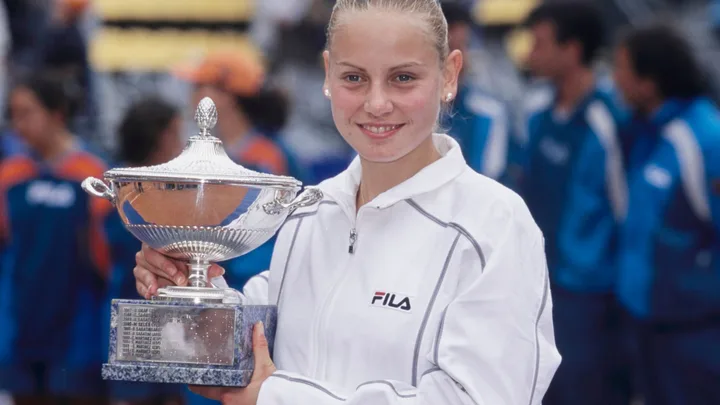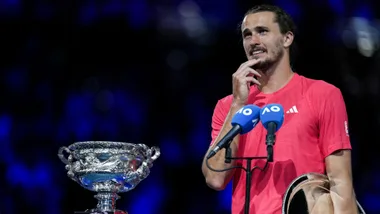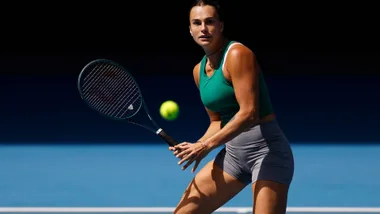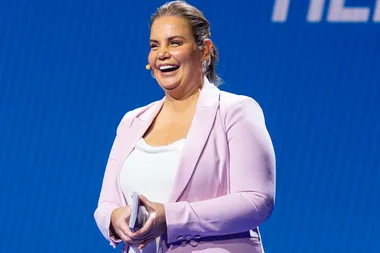Jelena Dokic was first introduced to tennis at the age of six, when a lesson taken just two months after her birthday revealed an instant love – and talent – for the sport that would change the course of her life.
But what began as an enjoyable new activity for the young girl quickly turned sour when, recognising his daughter’s natural talent, her father saw a chance to lift his family out of poverty and advance his own financial position.
“I had some good memories with both my mum and my father early on, but the day I had my first tennis lesson was the day that he beat me the very first time,” Dokic shared in a 2024 interview on ABC’s Conversations about her 2017 memoir Unbreakable.
Growing up in Yugoslavia, Dokic’s father Damir was desperate to escape the war-torn country and saw his daughter’s talent as a pathway to achieve that goal.
“He used to tell me all the time that if I didn’t make it in tennis, the family was not going to make it,” she said of her father’s controlling behaviour.
While they were still in Yugoslavia, Dokic found a semblance of protection from her grandfather, who she counts as being the only person to “step in aggressively and go up against him” when her own mother wouldn’t.
“She wanted to have a family and she was not going to let it fall apart,” said Dokic of her mother’s inability to protect her. “She always wanted to keep it together, no matter what the cost was.”
At the age of eight, two years after the abuse first started, the family fled Yugoslavia for Australia, leaving behind her grandfather who was sadly killed in the war a year later.
As Her Tennis Career Accelerated So Did The Violence
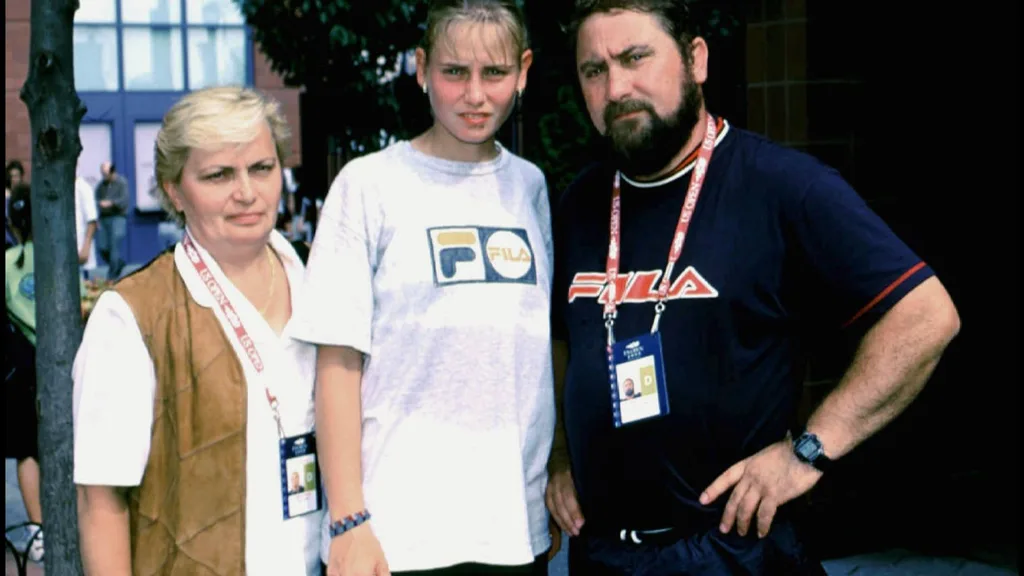
In her memoir, Dokic details how her father’s brutality continued to increase with every year, even after winning the 18s Nationals at 11.
She discussed the fact that she thought her father’s inability to adjust to his new life or pick up the language, contributed to his growing anger.
This, along with her father’s alcohol addiction, only escalated the abuse for Dokic.
“At the age of 11, I was kicked. I was beat up constantly. I was hit with a leather belt to the point of bleeding, at times,” she recalled.
“I was afraid to look at those bruises in the mirror, but sometimes I would, and there was not a centimetre of skin that was not bruised. It was tough.”
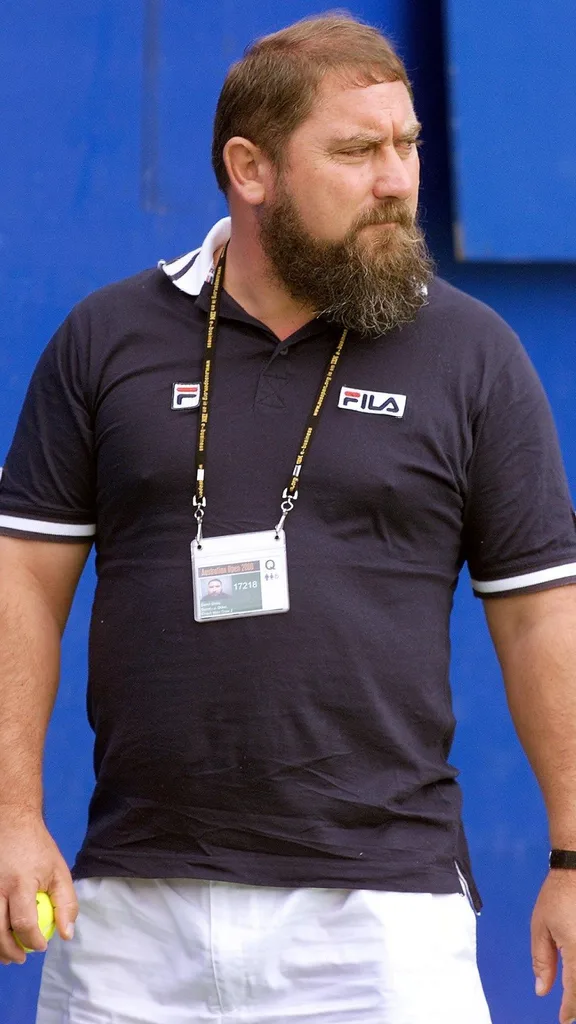
Dokic said in her memoir that the better she played, the worse the abuse got, and even more so when she suffered a loss like her first-round knock out during the 2000 du Maurier Open in Canada.
“It was a really nasty memory that will stay with me forever … I ended up fainting. He beat me really badly.”
“He beat the crap out of me,” she shares in the documentary. “He slammed my head hard against the wall multiple times. He actually punches me in the head. And then I went unconscious for a little bit. He also stepped on my head as well during the vicious attack.”
That same year, when the rising star was only 17, her semi-final loss to Lindsay Davenport at Wimbledon enraged her father so much that he refused to allow her to return to the hotel, and she was forced to sleep at the tennis courts.
She recalled the abuse – both physical and emotional – occurring on a near-daily basis, yet one of the most devastating aspects of all of this, is just how many people failed to protect Dokic from her father.
How Did The Tennis World React To The Jelena Dokic Abuse Allegations?
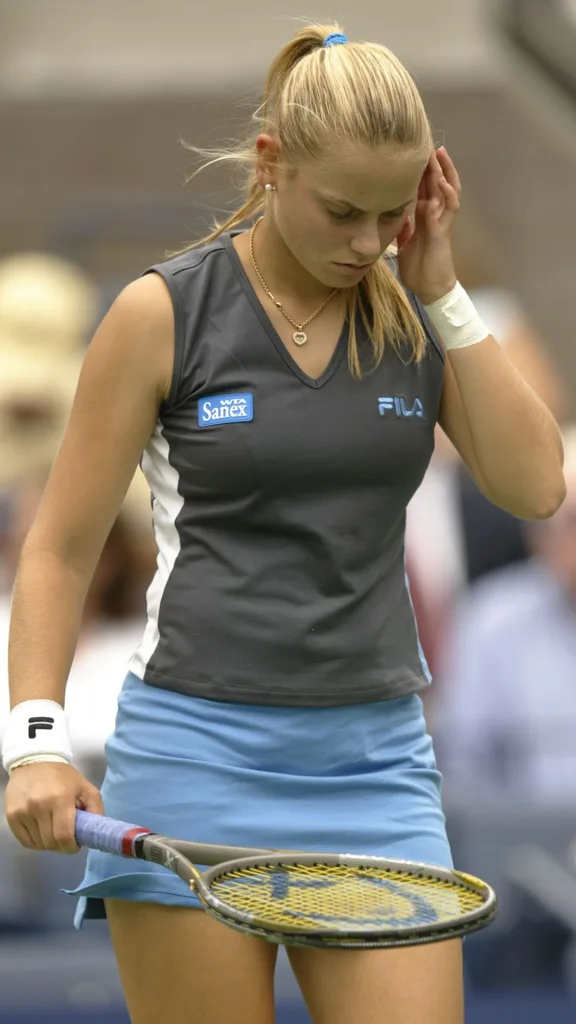
When the world first learnt the full extent of Dokic’s suffering in the pages of her 2017 memoir, the Tennis Association’s initial response was considered tepid at best.
“There were many in tennis at the time who were concerned for Jelena’s welfare, and many who tried to assist with what was a difficult family situation,” the statement said.
“Some officials even went as far as lodging police complaints, which without cooperation from those directly involved, unfortunately could not be fully investigated.”
So why didn’t someone – anyone – do something?
It’s a question that many asked in the months following her book’s release, and one that journalist, Richard Hinds, explored himself in a 2017 op-ed for the ABC.
“As a sports writer who regularly covered the grand slam tournaments throughout Dokic’s career, we all knew something was wrong with the Dokic family,” he wrote.
“Even if our suspicions did not touch the surface of the horrendous abuse now revealed. The erratic, often drunken public outbursts of Damir Dokic created obvious concerns.”
Hinds went further to discuss how, despite such concerns, the media still published whatever “incoherent rant” he responded to any questions about alleged abuse with.
Which, Hinds said, only gave “an abusive figure a legitimacy he did not deserve.
“Now anyone who watched Jelena Dokic’s tragedy unfold must concede a harsh truth or consign the next endangered prodigy to the same fate: We should have done more.”
Why Did Jelena Dokic Stop Playing For Australia?

Despite her shocking accounts of alleged abuse, one of the biggest revelations in Unbreakable was the pain she experienced after her father forced her to change her representative country from Australia to Yugoslavia, before removing the family from Australia in 2001.
The move was prompted by her father’s reaction to what he considered a barrage of negative press relating to both Dokic and his own aggressive outbursts, which were widely documented at the time.
“In 2001, 24 hours before stepping on court for my first round at the Australian Open against Lindsay Davenport — the world number one — my father decided I had to change nationalities and play for Yugoslavia,” said Dokic.
“Having to walk out in front of people bullying me, I literally just wanted the ground to open up and for me just to disappear and never come back.”
It’s this heartbreaking admission, as depicted in her memoir and the final scene of the Unbreakable documentary, that led to a full circle moment for Dokic.
“It was the 2023 Australian Open and I’m standing in front of 15,000 fans interviewing Novak Djokovic and the crowd is cheering us on,” she recalls.
“To think 20 years before on the very same court I was being booed by thousands of Aussie tennis fans who were all reacting to my father’s cruel decision to change my status from being Australian to playing for Yugoslavia.
“I don’t have regrets, but as extreme as this sounds, I would’ve taken any beating if it meant I could go back to that moment to represent my beloved Australia.
“My father robbed me of my home, my country, and for all those years the fans didn’t know the real truth… Standing there with Novak, I realised I am unbreakable. I can’t wait for the next chapter!”
Unbreakable: The Jelena Dokic Story premieres on Wednesday 29 January at 9pm on Nine and 9Now
Related articles:
- Jelena Dokic Has Speaks Out About Being Body-Shamed
- The Alexander Zverev Abuse Allegations, Explained
- Beyond 16 Days Of Activism: Why Men Need To Talk About Violence Against Women
